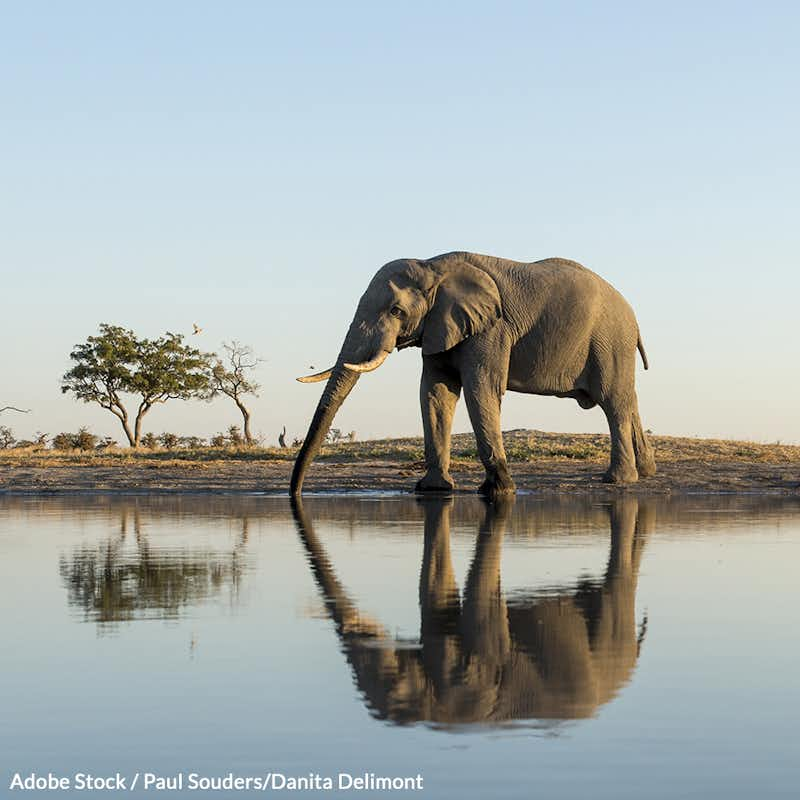Stop The Elephant Slaughter!
27,415 signatures toward our 50,000 Goal
Sponsor: The Animal Rescue Site
Botswana's leadership caved to agricultural interests in lifting its ban on hunting elephants. Demand it be restored!

Elephant meat is landing on the menu more and more in Central Africa and elsewhere around the world. Botswana's recent decision to lift the ban on elephant hunting has only motivated poachers to kill more.
Daniel Stiles, a conservationist with the Ol Pejeta Conservancy, first observed elephant meat for sale in 2011 in Cameroon, the Central African Republic, the Republic of Congo and the Democratic Republic of Congo1. Since then, stemming from an ongoing bushmeat shortage, elephant meat has expanded to markets around the world2.
Poaching has become the number one threat to endangered animals like elephants, and it's not elephant tusks they're after. It's food. Africans are literally eating away their natural heritage3.
It's estimated that a million metric tons of bushmeat is eaten every year — the equivalent of 9 billion quarter pounders — and it's distributed around the world, even to the United States4.
Shortly after being elected in 2019, Botswana's president, Mokgweetsi Masisi, gave three African leaders stools made of elephant feet5. A month later, he rescinded a ban on elephant hunting, citing a study that recommended "regular but limited elephant culling," in addition to establishing elephant meat canning for pet food and other products6.
Northern Botswana is home to Africa's largest elephant population, which grew steadily from 80,000 in 1996 to 129,000 in 20147. It happened as habitat loss and poaching devastated elephant populations across Africa. Between 2010 and 2012 alone, poachers slaughtered 100,000 African elephants8.
But Botswana's elephants are no longer safe.
The first Great Elephant Census, a pan-African survey of the continent's savanna elephants, revealed in 2016 that from 2007 to 2014, elephant numbers had plummeted by at least 30%, or 144,000 animals9. And in 2018, the carcasses of 87 elephants were found close to a protected sanctuary in Botswana. They had been killed for their tusks10.
Today, there are about half as many wild elephants in the world than there were in 1980, down from about 1.2 million to around 600,000. These amazing animals are cornerstone animals to their ecosystems and habitats. They also generate many more thousands of dollars in tourism than their meat alone could ever provide11.
Sign the petition below and ask the United Nations Secretary-General to condemn Botswana's decision to life the elephant hunting ban as being incompatible with the U.N.'s mission to recognize the intrinsic value of wildlife.
- Marc Silver, NPR (2 March 2015), "Elephant On The Menu? It's Not Just A Birthday Dish For Robert Mugabe."
- Melissa Cronin, The Dodo (25 March 2014), "African Bushmeat Market Exposed: 9,000 Primates Killed Each Year ."
- Dan Harris and Almin Karamehmedovic, ABC News (11 December 2009), "Bushmeat Sold on Open Market in U.S.."
- Wildlife Conservation Society (30 August 2016), "STUDY: A Lost Century for Forest Elephants."
- BBC (7 May 2019), "Botswana gives leaders stools made from elephant feet."
- Sasha Ingber, NPR (23 March 2019), "Botswana Lifts Its Ban On Elephant Hunting."
- U.S. Fish & Wildlife Service International Affairs, "African Elephant Conservation Fund."
- Brad Scriber, National Geographic (18 August 2014), "100,000 Elephants Killed by Poachers in Just Three Years, Landmark Analysis Finds."
- David McKenzie and Ingrid Formanek, CNN (1 September 2016), "'Our living dinosaurs' There are far fewer African elephants than we thought, study shows."
- James Masters, CNN (22 February 2019), "Botswana mulls turning elephants into pet food and lifting a hunting ban."
- Great Elephant Census (2016), "Conservation."
The Petition:
To the United Nations Secretary-General,
The decision of Botswana's president Mokgweetsi Masisi to lift his country's ban on elephant hunting has put countless elephants at risk by motivating poachers to kill even more.
Masisi's recommendation that elephants could be slaughtered for pet food is a horrific sentiment. These amazing animals are cornerstone animals to their ecosystems and habitats. They also generate many more thousands of dollars in tourism than their meat alone could ever provide.
Since 1980, the number of wild elephants in the world has been cut in half, down from about 1.2 million to around 600,000.
Northern Botswana is home to Africa's largest elephant population, which grew steadily from 80,000 in 1996 to 129,000 in 2014, despite increased poaching activity throughout Africa.
The elephants of Botswana now face a larger threat than ever before.
Mr. Secretary, please speak out and condemn Botswana's decision to lift its ban on hunting elephants. The future of this incredible animal is depending on you.
Sincerely,
 Welcome Back! Log In to Continue
Welcome Back! Log In to Continue